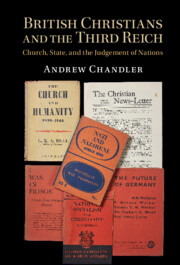Book contents
- British Christians and the Third Reich
- British Christians and the Third Reich
- Copyright page
- Dedication
- Contents
- Acknowledgements
- Introduction
- Part I An Inhabited Landscape
- Part II The German National Revolution, 1933–1934
- Part III Resisting a Rapprochement, 1935–1937
- Part IV Crisis, 1938–1939
- Part V The Onslaught, 1939–1943
- Part VI A Gathering Judgement, 1944–1949
- Endings and Legacies
- Bibliography
- Index
Endings and Legacies
Published online by Cambridge University Press: 05 May 2022
- British Christians and the Third Reich
- British Christians and the Third Reich
- Copyright page
- Dedication
- Contents
- Acknowledgements
- Introduction
- Part I An Inhabited Landscape
- Part II The German National Revolution, 1933–1934
- Part III Resisting a Rapprochement, 1935–1937
- Part IV Crisis, 1938–1939
- Part V The Onslaught, 1939–1943
- Part VI A Gathering Judgement, 1944–1949
- Endings and Legacies
- Bibliography
- Index
Summary
Cosmo Gordon Lang died on 5 December 1945. He remains one of the least understood, and most easily misrepresented, of the modern archbishops of Canterbury. It was perhaps not in his oversight of a domestic church but in his engagement with National Socialist Germany, and in his own campaign to avert a war that would costs millions of lives, that the truths of his idealistic character were most sharply revealed. Arthur Cayley Headlam remained Chairman of the Archbishop of Canterbury's Council on Foreign Relations until he retired in 1945, when he was replaced by Bishop Bell. He died on 17 January 1947. For all his early achievements as an ecumenist, his reputation has suffered severely because of his interventions in German affairs. It is likely that a full acknowledgement of the range of his contribution to the life of the ecumenical age at large, has yet to occur. His antagonist, Bishop Henson, died on 27 September that same year. George Bell would remain bishop of Chichester, almost to his death on 3 October 1958. It was often said that he had been turned down for the primacy because of his 1944 House of Lords speech against obliteration bombing, but this is only a shallow reflection on the realities which had made the Bishop of London, Geoffrey Fisher, the successor to William Temple.
- Type
- Chapter
- Information
- British Christians and the Third ReichChurch, State, and the Judgement of Nations, pp. 388 - 396Publisher: Cambridge University PressPrint publication year: 2022

